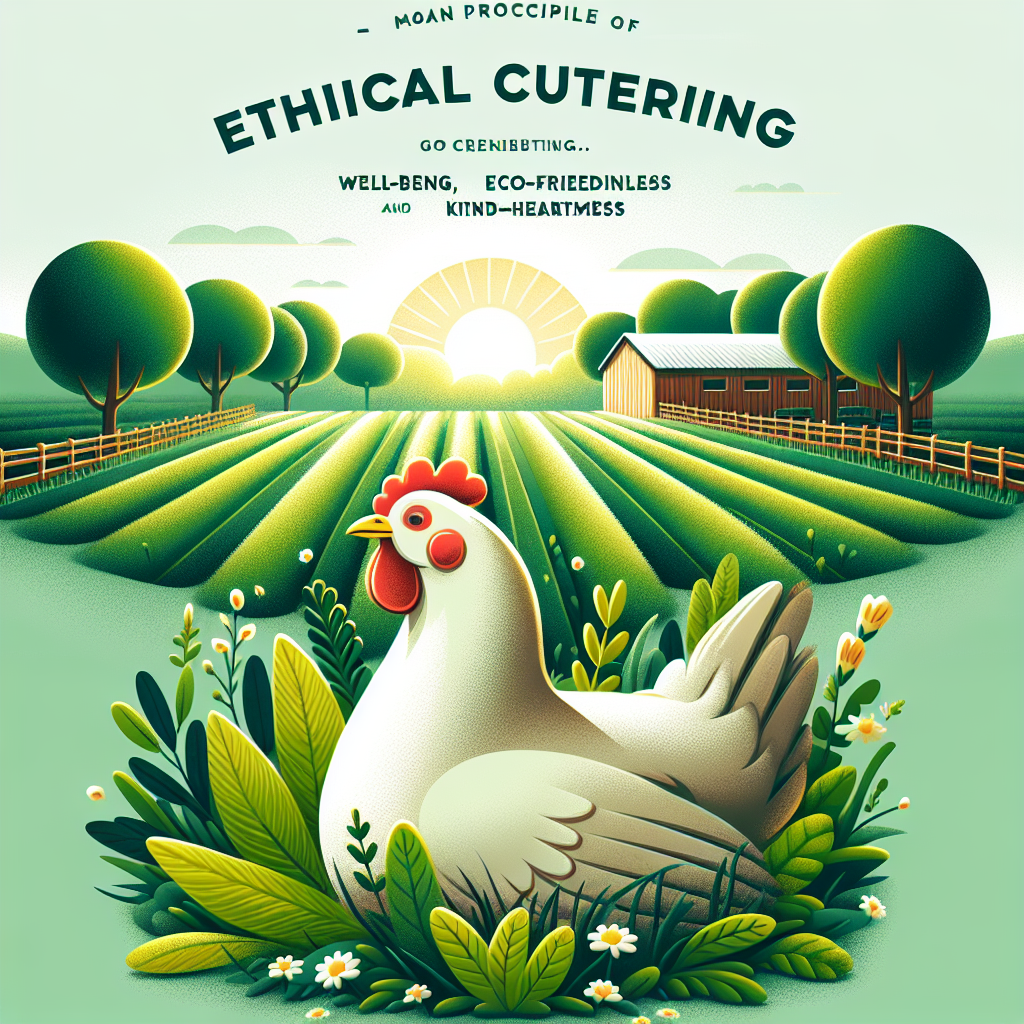Are you passionate about ethical chicken raising and want to spread awareness in your community? Look no further, as this article will provide you with valuable insights on how to educate your community about the importance of ethical chicken raising. From organizing informative workshops and creating engaging social media content to collaborating with local organizations, you will discover various effective strategies that will help you make a positive impact and encourage ethical practices within your community. So, grab a pen and paper, and let’s dig into this exciting journey of spreading the word about ethical chicken raising!
The Importance of Ethical Chicken Raising
Explanation of Ethical Chicken Raising
Ethical chicken raising refers to the practice of raising chickens in a manner that prioritizes their welfare, health, and overall well-being. It goes beyond simply producing chicken meat and eggs, focusing on creating a sustainable and compassionate environment for the chickens. This involves providing appropriate living conditions, adequate space to roam and exercise, a balanced diet, and access to fresh water. Ethical chicken raising also emphasizes the avoidance of unnecessary harm or suffering to the chickens throughout their lives.
Benefits of Ethical Chicken Raising
Embracing ethical chicken raising practices brings several benefits to both the chickens and the community. First and foremost, by ensuring the chickens are treated with care and respect, it promotes their health and overall quality of life. This results in better-tasting meat and eggs that are free from unnecessary chemicals or stress-induced hormones.
Additionally, ethical chicken raising contributes to sustainability. By allowing chickens to forage and consume natural food sources, it reduces the environmental impact associated with conventional chicken-raising methods. Furthermore, embracing ethical practices helps maintain the balance of ecosystems by reducing soil degradation and minimizing negative effects on surrounding wildlife.
Moreover, ethical chicken raising positively impacts local communities. It supports small-scale farmers and encourages sustainable agriculture practices. In turn, this boosts the local economy, promotes food security, and fosters a sense of community engagement and responsibility.
Ethical Considerations for Chicken Raising
When engaging in ethical chicken raising, it is important to consider various ethical considerations. Firstly, the chickens should be treated with compassion and provided with a living environment that allows them to exhibit natural behaviors and lead fulfilling lives. This includes providing sufficient space and stimulation, ensuring access to sunlight and fresh air, and prioritizing their mental and physical well-being.
Secondly, ethical chicken raising involves avoiding unnecessary harm and suffering. This means refraining from practices such as debeaking, which can cause pain and discomfort to the chickens. It also includes avoiding the use of antibiotics and growth hormones that may pose health risks to both the chickens and consumers.
Lastly, ethical chicken raising encompasses transparency and accountability. Farmers should strive to provide accurate and honest information about their practices, including the sourcing of feed, the use of medications, and the overall treatment of the chickens. This allows consumers to make informed choices and contributes to building trust within the community.
Understanding the Community
Researching Community Interests
Before embarking on an education plan, it is crucial to understand the interests and concerns of your community regarding ethical chicken raising. Conducting surveys, hosting focus groups, or engaging in one-on-one conversations with community members will provide valuable insights. This research will help tailor educational efforts to address specific interests and concerns, ensuring maximum engagement and impact.
Identifying Barriers and Objections
In addition to understanding community interests, it is important to identify any potential barriers or objections that may hinder the adoption of ethical chicken raising practices. Common concerns include lack of space, perceived difficulty in implementation, or misconceptions about the implications of ethical chicken raising. By recognizing and addressing these concerns early on, you can develop targeted educational materials and strategies to overcome these barriers.
Developing an Education Plan
Setting Clear Objectives
When developing an education plan for promoting the importance of ethical chicken raising, it is essential to set clear objectives. These objectives will guide your efforts and determine the desired outcomes of your educational initiatives. Examples of objectives may include increasing awareness about ethical chicken raising, promoting behavior change among community members, or encouraging local policymakers to support animal welfare legislation.
Choosing Effective Communication Channels
To effectively educate the community about ethical chicken raising, it is crucial to choose the most appropriate communication channels. This may include a combination of traditional methods such as community meetings or workshops, as well as digital platforms like websites, social media, and blogs. By utilizing a mix of communication channels, you can reach a wider audience and cater to diverse preferences and accessibility.
Creating Engaging Educational Materials
Developing engaging educational materials is key to capturing the attention and interest of the community. These materials can include brochures, infographics, videos, and interactive online content. The content should be easily understandable, visually appealing, and highlight the benefits of ethical chicken raising. Incorporating personal stories, testimonials, and success stories from local chicken raisers can also help create a sense of relatability and inspire behavior change within the community.
Engaging the Community
Organizing Community Meetings
Community meetings provide a valuable opportunity to engage directly with community members, address their concerns and questions, and provide hands-on demonstrations or workshops. These meetings can be held in community centers, schools, or even in local farms. Encourage open dialogue and collaboration, inviting local experts or experienced chicken raisers to share their knowledge and experiences. This creates a sense of shared responsibility and fosters a supportive community network.
Collaborating with Local Organizations
Collaborating with local organizations, such as agricultural associations or environmental groups, can amplify your educational efforts and expand your reach within the community. Partnering with these organizations allows for shared resources, access to diverse expertise, and potential funding opportunities. It also strengthens the credibility and visibility of your initiatives.
Conducting Workshops and Demonstrations
Organizing workshops and demonstrations provides a hands-on learning experience for community members. These interactive sessions can cover various aspects of ethical chicken raising, including proper coop setup, feeding practices, and health management. Additionally, conducting egg collection or chicken feeding demonstrations can help community members gain confidence and overcome any perceived barriers to entry.
Addressing Community Concerns
Explaining Food Safety and Quality
One common concern surrounding ethical chicken raising is related to food safety and quality. Address this concern by explaining the strict biosecurity measures and proper hygiene practices that are implemented in ethical chicken raising. Highlighting the benefits of consuming eggs and meat that are free from hormones and antibiotics, along with proper storage and cooking instructions, helps alleviate any concerns and promotes confidence in the safety and quality of the products.
Addressing Environmental Impact
Another important concern to address is the environmental impact of ethical chicken raising. Explain how this approach minimizes pollution, soil degradation, and deforestation compared to conventional practices. Emphasize the benefits of reducing reliance on industrial-scale farming methods, which often contribute to the emission of greenhouse gases and the depletion of natural resources. By highlighting the positive environmental impact of ethical chicken raising, community members are more likely to embrace these practices.
Discussing Economic Considerations
Economic considerations are often raised as potential obstacles to adopting ethical chicken raising. Discuss the financial benefits, such as cost savings in feed expenses, reduced veterinary costs due to healthier chickens, and potential income from selling surplus eggs or chicks. Additionally, highlight the positive impact on the local economy by supporting small-scale farmers and promoting sustainable agricultural practices. By illustrating the potential economic advantages, you can demonstrate that ethical chicken raising is not only beneficial ethically, but also financially.
Promoting Local Chicken Raising Initiatives
Encouraging Backyard Chicken Raising
Promoting backyard chicken raising initiatives is an effective way to engage the community. Encourage individuals and families to consider raising a few chickens in their backyards, providing them with fresh eggs and enabling a deeper connection to the food they consume. Provide resources and guidelines on setting up a small coop, regulations regarding local zoning, and tips for proper care and management of backyard chickens. Creating awareness about the benefits and feasibility of backyard chicken raising can inspire community members to take the first step.
Supporting Local Farmers
Supporting local farmers who prioritize ethical chicken raising practices is essential for fostering a sustainable food system. Encourage community members to buy locally produced chicken meat and eggs, thereby supporting farmers who embrace ethical practices. Establish farmer’s markets, food co-ops, or community-supported agriculture (CSA) programs to facilitate direct connections between consumers and local chicken raisers. By creating channels that facilitate the purchase of ethically raised chicken products, you contribute to the financial stability and overall success of local farmers.
Highlighting Success Stories
Highlighting success stories from local individuals or businesses that have adopted ethical chicken raising practices is a powerful tool to inspire and motivate the community. Share stories of small-scale farmers who have experienced improved financial viability, enhanced community connections, and personal satisfaction through ethical chicken raising. Include testimonials from community members who have embraced these practices and experienced positive changes in their own lives. These success stories serve as tangible evidence that ethical chicken raising is achievable and beneficial for all.
Creating Awareness Campaigns
Utilizing Social Media Platforms
Social media platforms provide a cost-effective and efficient way to reach a large audience and generate awareness about ethical chicken raising. Utilize platforms such as Facebook, Twitter, and Instagram to share educational content, success stories, and engaging visuals. Encourage community members to share their own experiences and join the conversation through hashtags or online forums. Regularly update the social media channels with relevant information and respond to questions or comments promptly to foster a sense of community engagement.
Developing Educational Websites and Blogs
Creating educational websites and blogs dedicated to ethical chicken raising serves as a valuable resource for community members seeking information and guidance. Provide comprehensive information on all aspects of ethical chicken raising, including coop setup, feeding practices, health management, and legal considerations. Publish blog posts featuring success stories, latest research, and practical tips. Ensure the website or blog is user-friendly and easily accessible to all community members.
Engaging with Local Media Outlets
Engage with local media outlets, such as newspapers, radio stations, and television channels, to share stories and educational content related to ethical chicken raising. Pitch articles or opinion pieces to local newspapers, offering expert insights or personal perspectives on the benefits and importance of ethical chicken raising. Collaborate with local radio stations or television channels to conduct interviews or host talk shows on this topic. By leveraging the reach of local media outlets, you can amplify the message and extend its impact within the community.
Working with Schools and Educational Institutions
Implementing Ethical Chicken Raising into Curriculum
Collaborate with schools and educational institutions to implement ethical chicken raising into their curriculum. Offer resources and lesson plans that can be incorporated into science, biology, or environmental studies classes. Arrange for presentations or guest lectures where experts can speak to students about the importance of ethical chicken raising and its implications for sustainability and animal welfare. By integrating these topics into formal education, you instill a sense of responsibility and empower future generations to make informed choices.
Organizing Field Trips and Guest Lectures
Organize field trips to local farms or educational institutions that practice ethical chicken raising. This provides students with an opportunity to witness firsthand the positive impact of ethical practices on the chickens’ lives and the surrounding environment. Additionally, arrange guest lectures by local farmers or agricultural experts who can share their experiences and knowledge. These interactive experiences help students develop a deeper understanding and appreciation for ethical chicken raising.
Providing Educational Resources for Students
Develop educational resources specifically tailored for students, including informative brochures, posters, and interactive activities. These resources can be distributed to schools and made available online for easy access. Collaborate with teachers to incorporate these resources into classroom discussions and assignments. By providing educational materials that align with the curriculum, you ensure that students receive comprehensive information on ethical chicken raising and its significance.
Encouraging Policy Changes
Lobbying for Animal Welfare Legislation
Advocate for animal welfare legislation at the local, regional, or national level. Collaborate with animal welfare organizations or local policymakers to propose and support laws that protect the welfare of chickens raised for food production. Provide scientific evidence and public opinion to build a strong case for the adoption of such legislation. By actively participating in the policymaking process, you contribute to the larger goal of improving the welfare standards for animals.
Collaborating with Local Government
Engage with local government officials and policymakers to raise awareness about ethical chicken raising and its potential benefits to the community. Offer to provide educational materials, share success stories, or organize workshops specifically for local government employees. Build relationships with policymakers to influence their decision-making processes and encourage their support for initiatives that prioritize ethical chicken raising.
Writing Articles and Op-Eds
Write articles and opinion pieces for local newspapers, magazines, or online publications to reach a broader audience and advocate for ethical chicken raising. Share personal experiences, scientific research, or real-world examples to highlight the importance of ethical practices. Offer your expertise and insights on the subject matter, encouraging readers to think critically and reconsider their own choices. By submitting thought-provoking articles or op-eds, you contribute to the ongoing dialogue surrounding ethical chicken raising.
Building a Supportive Community Network
Establishing Chicken Raising Associations
Create local chicken raising associations or clubs to foster a supportive community network. These associations provide a platform for chicken raisers to share knowledge, exchange best practices, and troubleshoot challenges together. Host regular meetings or events where members can connect, offer mentorship opportunities for newcomers, and encourage collaboration on community projects. By building a strong network, you ensure that individuals feel supported and empowered throughout their ethical chicken raising journey.
Creating Online Forums and Discussion Groups
Establish online forums and discussion groups dedicated to ethical chicken raising. These platforms allow community members to share their experiences, ask questions, and receive support from fellow chicken raisers. Moderated by knowledgeable individuals or experts, these forums ensure that accurate information is shared and that discussions remain respectful and inclusive. By facilitating online communities, you create a space for ongoing learning and collaboration.
Organizing Annual Fairs and Expos
Organize annual fairs or expos dedicated to ethical chicken raising, bringing together community members, experts, and local businesses. These events showcase various aspects of ethical chicken raising, including proper coop designs, innovative feeding methods, and success stories. Provide educational workshops, guest lectures, and interactive activities for attendees. This not only educates the community but also creates opportunities for networking, fostering a sense of belonging and support within the community.
By following these comprehensive strategies, you can effectively educate your community about the importance of ethical chicken raising. Through engagement, awareness campaigns, partnerships, and policy advocacy, you can inspire positive change and foster a community that values the welfare of chickens and embraces sustainable agricultural practices.




